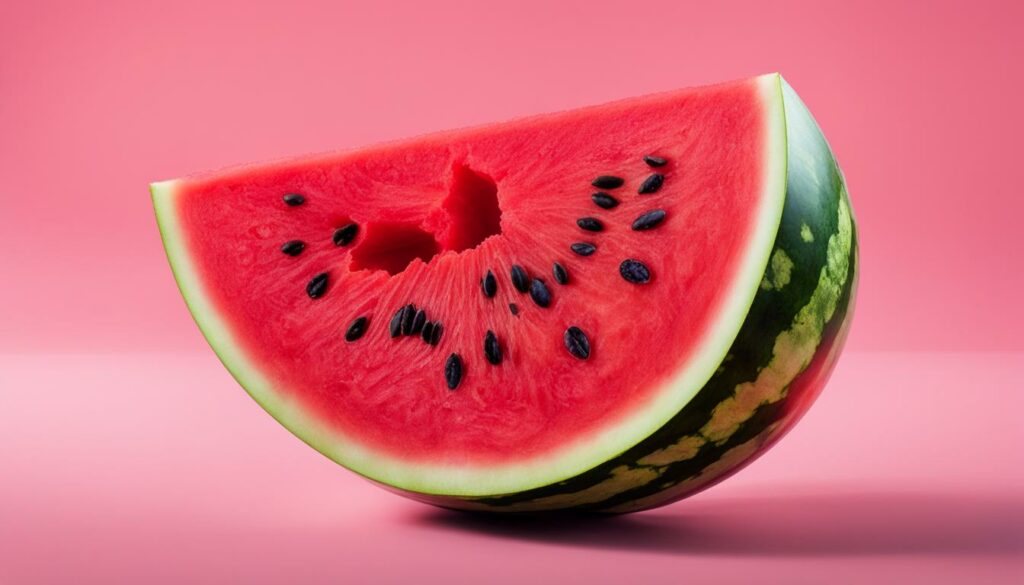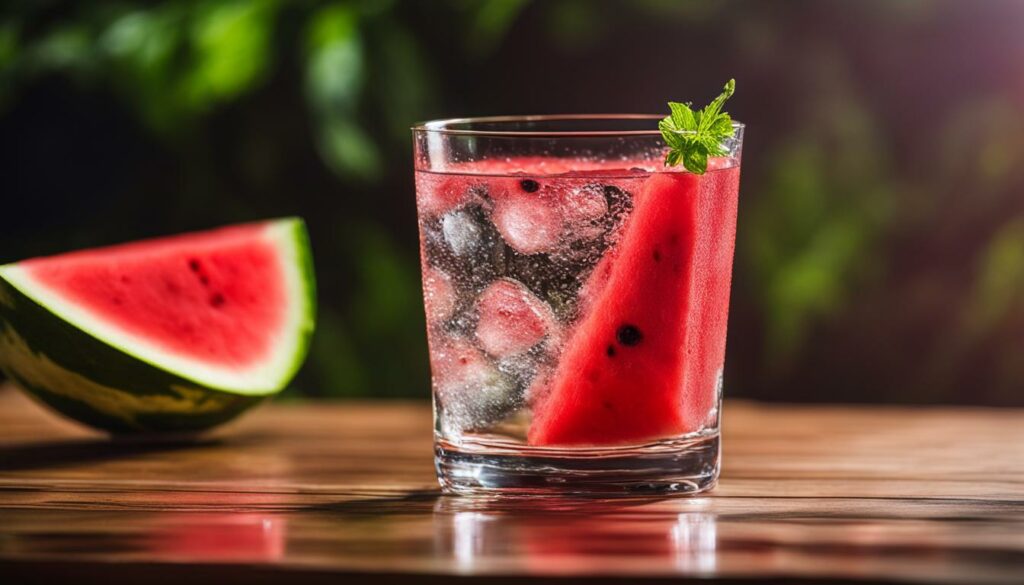When it comes to natural testosterone boosters, watermelon may not be the first food that comes to mind.
However, this juicy fruit has been gaining attention for its potential effects on testosterone levels and male hormone balance. Packed with nutrients such as potassium, magnesium, vitamins A and C, and citrulline, watermelon offers more than just hydration on hot summer days.
Citrulline, an amino acid found in watermelon, has been shown to improve exercise performance and cardiovascular fitness.
It can aid in the production of nitric oxide, a compound that helps relax and dilate blood vessels, promoting healthy blood flow throughout the body. Additionally, the antioxidant content in watermelon, including lycopene, may support a healthy heart and lower blood pressure.
But what about its effects on testosterone? While more research is needed, some studies suggest that watermelon consumption may have positive effects on sexual health. This includes potential benefits for erectile dysfunction and male fertility.
The exact mechanisms behind these effects are still being studied, but watermelon’s nutrient profile and antioxidant properties make it a promising addition to a healthy diet.
Key Takeaways:
- Watermelon is packed with nutrients and antioxidants that support overall health and wellness.
- The citrulline in watermelon may improve exercise performance and cardiovascular fitness.
- Watermelon’s antioxidant content, including lycopene, may promote a healthy heart and lower blood pressure.
- While more research is needed, watermelon consumption may have positive effects on sexual health, including potentially aiding in erectile dysfunction and improving fertility.
- Incorporating watermelon into your diet can offer hydration, cardiovascular benefits, and potential improvements in sexual performance.
The Benefits of Watermelon for Sexual Health
When it comes to boosting sexual health, watermelon has emerged as a juicy contender. This refreshing fruit offers a range of benefits that can positively impact men’s sexual well-being. From improving blood flow to increasing libido, watermelon has the potential to enhance sexual performance and satisfaction.
Improved Blood Flow for Erectile Function
Watermelon contains an amino acid called L-citrulline, which plays a key role in promoting blood flow. By helping blood vessels widen, L-citrulline can contribute to improved circulation, including in the genital area.
This effect is particularly significant for men with erectile dysfunction, as adequate blood flow is essential for achieving and maintaining an erection.
A review of studies on L-citrulline supplementation found that it can enhance erection firmness, sexual satisfaction, and the ability to maintain an erection. These findings highlight the potential of watermelon as a natural remedy for erectile dysfunction and a Viagra-like alternative.
Increased Libido and Sexual Performance
Watermelon’s benefits extend beyond improving blood flow. The fruit also contains nutrients and compounds that can positively impact libido and sexual performance. By addressing factors such as stress and circulation, watermelon can help create a more satisfying sexual experience.
The combination of L-citrulline and other nutrients found in watermelon can promote overall cardiovascular health, leading to better blood flow not only to the genitals but also throughout the body.
Improved circulation can enhance sexual function and increase arousal. Additionally, watermelon’s hydrating properties help maintain optimal bodily functions, vital for overall sexual health and well-being.
Reduced Stress and Enhanced Sexual Satisfaction
Stress is a common factor that can negatively impact sexual health and performance. However, watermelon may offer some relief. This fruit contains vitamins and minerals, such as vitamins A and C, that can help combat stress and promote a healthy nervous system.
By reducing stress levels, watermelon can contribute to enhanced sexual satisfaction and performance. A relaxed mind and body can result in improved arousal, endurance, and overall sexual well-being.
Watermelon and Male Fertility
When it comes to male fertility, watermelon may offer several benefits. The antioxidant lycopene found in watermelon has been shown to help reduce oxidative stress, which can have a positive impact on fertility.
Oxidative stress can harm the reproductive system, leading to reduced sperm quality and fertility. By incorporating watermelon into your diet, you can potentially improve your chances of conceiving.
In addition to lycopene, watermelon’s high water content and hydrating properties can also support overall prostate health. The prostate gland plays a crucial role in male reproductive health, and maintaining its well-being is essential.
Watermelon’s hydration benefits, combined with the presence of lycopene and other antioxidants, can help protect the prostate gland against oxidative stress, potentially reducing the risk of prostate cancer.
So, if you’re looking to enhance your fertility and promote prostate health, consider adding more watermelon to your diet.

| Fertility | Sperm Quality | Prostate Health |
|---|---|---|
| Watermelon’s antioxidant lycopene may help reduce oxidative stress, improving male fertility. | Oxidative stress can damage sperm, leading to reduced quality and fertility. | Lycopene and other antioxidants in watermelon can protect the prostate gland against oxidative stress and lower the risk of prostate cancer. |
| High water content and hydrating properties of watermelon support overall prostate health. |
Watermelon for Overall Health and Wellness
In addition to its potential sexual health benefits, watermelon offers a range of advantages for overall health and wellness. The high water content of watermelon helps with hydration, which is essential for proper organ function, nutrient delivery, and cognitive function.
Watermelon’s nutrient profile, including potassium and magnesium, can support muscle recovery and enhance workout performance.
These minerals are crucial for maintaining muscle function and preventing muscle cramps during physical activity. Potassium, in particular, helps maintain proper electrolyte balance, which is essential for muscle contraction and optimal workout performance.
Watermelon is also packed with lycopene, an antioxidant that may promote cardiovascular health by reducing blood pressure and protecting against oxidative damage.
Studies have shown that a higher intake of lycopene-rich foods, such as watermelon, is associated with a reduced risk of cardiovascular diseases, including heart disease and stroke.
Furthermore, the fiber content in watermelon can aid digestion and promote regular bowel movements. Fiber helps regulate digestion by adding bulk to the stool and preventing constipation.
Overall, incorporating watermelon into your diet can provide hydration benefits, support workout performance, promote cardiovascular health, and aid digestion.

Nutritional Content of Watermelon (per 100g)
| Nutrient | Amount |
|---|---|
| Water | 91.5g |
| Calories | 30 |
| Carbohydrates | 7.6g |
| Fiber | 0.4g |
| Protein | 0.6g |
| Fat | 0.2g |
| Calcium | 7mg |
| Potassium | 112mg |
| Vitamin C | 8.1mg |
| Vitamin A | 569IU |
Conclusion
Watermelon is a versatile and nutritious fruit that offers several potential benefits for sexual health and overall well-being. Its high content of L-citrulline, an amino acid that improves blood flow, makes it a promising natural option for men’s health.
Incorporating watermelon into your diet, whether in its whole fruit or juice form, can contribute to hydration, cardiovascular health, muscle recovery, and potentially improved sexual performance.
While more research is needed to fully understand the effects of watermelon on testosterone levels and sexual function, the abundance of nutrients in watermelon, including vitamins A and C, potassium, and magnesium, make it a valuable addition to a balanced diet.
These nutrients promote overall well-being, supporting various bodily functions and enhancing overall vitality.
It’s important to note that individual experiences may vary, and consulting with a healthcare provider is recommended for personalized advice and guidance. While watermelon is often referred to as a natural Viagra, it is not a substitute for medical treatment or prescribed medications.
However, incorporating watermelon into a healthy lifestyle can provide an array of benefits, promoting sexual health, overall well-being, and a refreshing addition to one’s diet.
FAQ
Can watermelon increase testosterone levels?
While watermelon contains nutrients that are important for testosterone production, there is limited scientific evidence to suggest that watermelon can directly increase testosterone levels. However, watermelon’s high content of L-citrulline and other nutrients make it a promising natural option for supporting overall hormonal balance.
Is watermelon a natural testosterone booster?
Watermelon is not widely recognized as a natural testosterone booster. However, its nutrient profile, including L-citrulline and antioxidants, may indirectly support testosterone production by promoting overall health and hormonal balance.
What are some foods that increase testosterone?
Several foods are believed to support testosterone production, including oysters, lean meats, eggs, fortified milk, beans, nuts, and seeds. While watermelon hasn’t been specifically studied for its testosterone-boosting effects, its nutrient content and potential effects on hormonal balance make it a healthy addition to a balanced diet.
Can watermelon affect testosterone levels?
The exact impact of watermelon on testosterone levels is not well-documented. However, watermelon’s nutrient profile, including L-citrulline and other antioxidants, may have indirect effects on hormonal balance and overall health.
Can watermelon improve male fertility?
Watermelon contains lycopene and other antioxidants, which may help reduce oxidative stress and improve male fertility. However, more research is needed to understand the specific effects of watermelon on fertility.
Does watermelon help with erectile dysfunction?
Watermelon contains L-citrulline, an amino acid that can improve blood flow. Improved blood flow is essential for achieving and maintaining an erection, so watermelon may have positive effects on erectile dysfunction. However, more research is needed to fully understand its effectiveness.
Can watermelon increase libido?
Watermelon’s potential effects on libido have not been extensively studied. However, its high content of L-citrulline and other nutrients that support overall health may indirectly contribute to improved sexual desire.
How does watermelon benefit overall health and wellness?
Watermelon’s high water content helps with hydration, which is crucial for organ function, nutrient delivery, and cognitive function. Its nutrient profile, including potassium and magnesium, can support muscle recovery and enhance workout performance.
The antioxidants in watermelon may promote cardiovascular health, and its fiber content can aid digestion and regular bowel movements.
Can watermelon lower blood pressure?
Watermelon contains lycopene and other antioxidants that may help reduce blood pressure. However, it is important to note that watermelon’s effects on blood pressure may vary depending on individual health conditions and overall diet.
Are there any risks or side effects associated with consuming watermelon?
Watermelon is generally considered safe for most people when consumed in moderation. However, some individuals may experience allergic reactions or digestive discomfort. It’s important to be mindful of portion sizes and consult with a healthcare provider if you have any specific concerns or pre-existing medical conditions.




